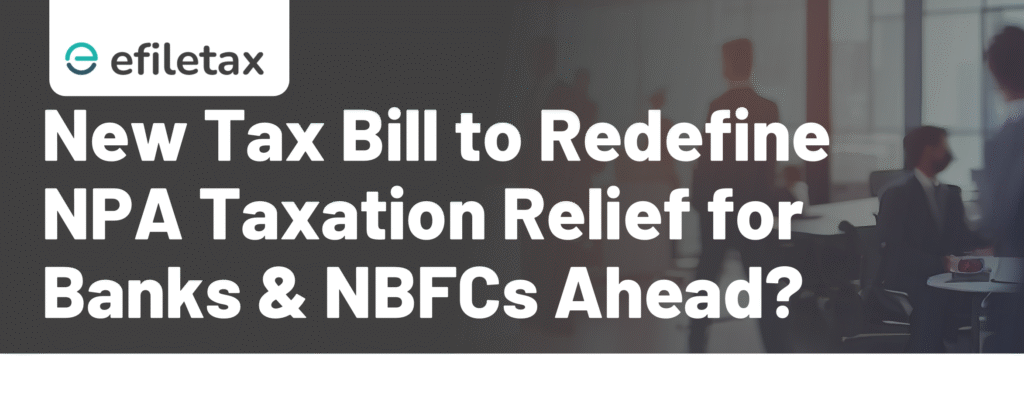
NPA Taxation Aligned with RBI Norms: What the New Income Tax Bill Means for You
The new Income Tax Bill proposes to align the tax treatment of Non-Performing Assets (NPAs) with RBI’s 90-day default rule. This move could finally resolve the ongoing tax disputes around unrealised interest income on bad loans.
Let’s break down what’s changing and why it matters.
What is an NPA under RBI Rules?
According to the RBI’s Master Circular on Prudential Norms, an account is classified as a Non-Performing Asset (NPA) when:
- Interest or principal is overdue for more than 90 days in case of term loans
- The account shows continuous default or irregularity beyond 90 days
Currently, tax authorities often do not accept this 90-day rule for tax purposes. Instead, they rely on Section 43D of the Income-tax Act, leading to mismatches.
Why is NPA Taxation a Problem?
- Under Section 43D, certain financial institutions (like banks, NBFCs, etc.) can defer interest income recognition on NPAs until actual receipt.
- But this benefit does not automatically apply to all taxpayers, including co-operative banks or small lenders.
- Result? They face tax demands on unrealised income, even when the borrower hasn’t paid up.
This creates unjust taxation, especially when RBI regulations already mark such accounts as NPAs.
Supreme Court Verdict: Real Income Matters
In Vasisth Chay Vyapar Ltd vs CIT (2025 SC ruling), the Supreme Court reaffirmed the ‘real income’ doctrine:
“Interest income on NPAs cannot be taxed unless actually received.”
This case finally brought judicial clarity in favour of taxpayers.
Yet, the law hasn’t caught up with the judgment in practice—until now.
What Does the New Income Tax Bill Propose?
The draft bill seeks to:
- Define NPAs based on the RBI’s 90-day norm, not the existing 180-day or longer tax perspective
- Make the ‘real income’ principle part of the law, not just a judicial interpretation
- Reduce litigation by ensuring that interest on NPAs is not taxed until realised
- Apply uniformly across institutions, including co-operative banks and smaller NBFCs
Tax Rule vs RBI Rule: Key Differences
| Feature | Current Tax Law (43D) | RBI Norm (Prudential) |
|---|---|---|
| NPA Classification | Often beyond 180 days | After 90 days default |
| Tax on Accrued Interest | Yes, for some entities | Not applicable |
| Real Income Principle | Case-by-case application | Regulatory standard |
| Beneficiary Entities | Scheduled banks, few NBFCs | All lenders under RBI |
Expert Insight: Why This Matters for Taxpayers
“The draft bill brings statutory parity between RBI norms and income tax. It can end repetitive litigation on interest taxation, especially for smaller financial players,” says a Chennai-based tax consultant.
It also signals a shift towards substance over form—recognising only real income for taxation.
Select Committee Wants More Clarity
While the proposed change is welcome, the Parliamentary Select Committee has raised two concerns:
- The bill should define “realisation” clearly—does it include settlements, one-time write-offs, or only cash?
- There should be safeguards against tax avoidance under the garb of NPA restructuring.
Expect refinements in the final bill, but the direction is clear.
Practical Impact: Who Benefits?
- Co-operative banks not covered under Section 43D will now gain protection
- NBFCs dealing with rural or MSME lending will see reduced tax burdens
- Litigation-prone cases involving unrealised interest will drop
- Tax consultants and CAs can now offer uniform advice across client profiles
What Should You Do Now?
- Track the final version of the Income Tax Bill when tabled in Parliament
- Review your loan book for NPA classification
- Consult a tax expert on whether your interest income recognition policy aligns with the new norms
FAQs
Q1. Will the new provision apply retrospectively?
Unlikely. Most tax amendments are prospective unless explicitly stated. Wait for the bill text.
Q2. Can co-operative societies benefit from the new rule?
Yes, if the bill’s language includes them. Currently, they don’t get relief under Section 43D.
Q3. Is the RBI’s NPA definition available online?
Yes. Refer to the RBI Master Circular on Prudential Norms.
Summary
The new Income Tax Bill proposes aligning NPA tax treatment with RBI’s 90-day rule, ensuring interest is taxed only when realised—reducing disputes and tax burden.
Need help navigating complex tax provisions or real income disputes?
Let Efiletax simplify it for you.
From interest income computation to NPA reporting, our expert filing and advisory services ensure peace of mind.